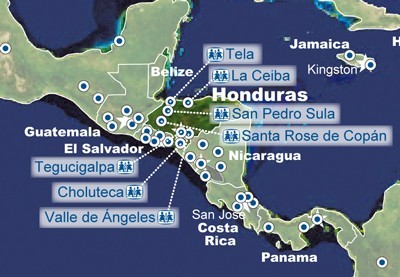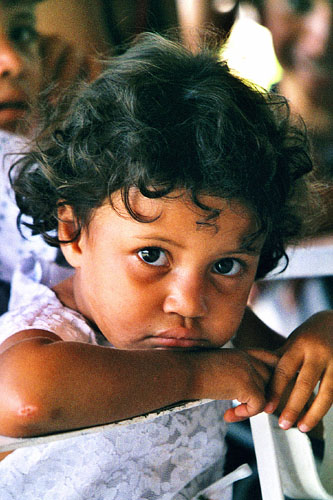SOS Children in Honduras
 Overview of Honduras
Overview of Honduras
Honduras is the second largest republic in Central America.
Malnutrition, poor housing and infant diseases are widespread. Social problems include high rates of infant and child mortality and malnutrition in children under five, as well as a sharp increase in HIV/AIDS. The average daily income is less than £1.80 (£46.60 in the UK).
Our Work in Honduras
Tegucigalpa
Hurricane Mitch in 1998 compounded many of these problems. At least 5,000 people were killed and 70 per cent of the country's crops were destroyed. The damage was estimated at three billion dollars, setting development back by decades. We began working in Honduras in 1970 when our first community opened in the capital, Tegucigalpa. Twenty-five years later the original Village was closed and a new Village rebuilt to modern standards, in the residential area of Colonia Las Hadas de Comayaguela, south-east of the city and close to the airport. The new Village has 15 family houses and two SOS Youth Homes, where the older children live while taking their first guided steps towards independence, and a nursery also open to children from the surrounding area.
San Pedro Sula
In 1974 SOS Children built a second community on the outskirts of San Pedro Sula in northern Honduras, the country's second largest city, following a national emergency. It was rebuilt in 1991 on a site surrounded by trees and hills. SOS Children's Village San Pedro Sula has 14 family houses, an SOS Youth Home, an SOS Nursery and an SOS Medical Centre which treats on average 50 patients a day from the local community. A farm provides produce for the Village as well as vocational training in farming skills.

Tela
We built a third community, SOS Children's Village Tela in northern Honduras in 1979 following severe flooding in the area. As well as 12 family houses and 12 SOS Youth Homes, the Village has an SOS Nursery and two SOS Schools (primary and secondary). Vocational training is provided, with a nursing school, and workshops and training in carpentry, dressmaking, electronics, metalwork, IT and office skills. The Village farm also provides agricultural training opportunities as well as produce for the SOS families.
La Ceiba
SOS Children built SOS Children's Village La Ceiba in 1984 in the village of Aldea la Ruidosa, about 12 miles from the town of La Ceiba in northern Honduras. It has 16 family houses, a youth house and an SOS Nursery. The children attend local schools.
Valle de Ángeles
SOS Children's Village Valle de Ángeles is 20 miles from Teguciglapa and is specifically for seriously mentally and physically handicapped children. The Village has been adapted to provide the children with as much mobility as possible, and a special needs school, a clinic and treatment rooms for occupational, hydro, speech and physiotherapy, as well as massage, have also been established. An SOS Youth Home provides handicrafts training for older girls.
Choluteca
When Hurricane Mitch struck Honduras in 1998, SOS Children mounted an emergency relief programme providing shelter, food and medicines for over 3000 families. Because of the large numbers of orphans and neglected children left in its wake, a new village was built in one of the worst affected areas in southern Honduras, close to the border with Nicaragua. The first children moved into SOS Children's Village Choluteca in November 2000. The Village has a number of family houses which are home to well over 100 children. An SOS Social Centre provides day care for the children of local working families and single mothers.
Santa Rosa de Copan
A seventh SOS Children's Village opened in Santa Rosa de Copan in Western Honduras. There are 14 family houses for orphaned and abandoned children.
Life in SOS Children's Villages Honduras: Five Siblings
In August 2007, five siblings were admitted to SOS Children's Village Tegucigalpa in Honduras. They were in a social risk situation before. Now, their faces reflect the joy of living with a family.
Gloria, who is twelve years old, is the oldest sister. She helped her younger siblings to quickly adapt to their corresponding school grade. The girl is in an early stimulation programme, which is an accelerated primary education project, given that with her age she could not attend the normal school system. Through this programme, she will complete her primary education and receive her sixth grade diploma. Gloria likes to draw and go shopping at the market to help her SOS mother. "What I like the most about living with my siblings is to be able to share time with them and be able to watch over them... my happiest day was my last birthday, because I was with them."
Her sister Mary is ten years old and she attends first grade at the community elementary school. Although she is usually very quiet, she says: "What I like the most about living here is that I can talk and play with my siblings."
Edward is the only boy in this family group. He is eight years old, attends second grade at the community elementary school and loves riding his bicycle. Eduardo is a very active child and is always doing something; he is very outgoing, too. "The happiest day ever for me at the village was Christmas", he recalls with a big smile on his lips.
Out of the five siblings, six-year-old Roxana is the most playful, sociable and affectionate one. She is now in third grade at the community elementary school. The smallest is Cristina, who is barely four years old. She is always 'super glued' to her SOS mother and accompanies her everywhere, according to the village social worker.
Now they are happy to be part of a new home within the great SOS family. The family house, where the five siblings live at present along with four SOS siblings, is where the administrative offices of the village used to be located. With the help of an U.S. organization, which provided a valuable gift due to the need of welcoming this group of siblings, it was possible to remodel those offices and transform them into what is now a home. In the little faces of Gloria, Maria, Eduardo, Roxana and Cristina it is evident how happy they are to have a home, a family and the right to education, so they can forge a successful future.
SOS mother Avelina, who has been working for SOS Children's Villages for eleven years, says: "Living with them has been very good, these children are affectionate, they collaborate, and, more importantly, they are growing up together as a family".
For privacy reasons, we have changed the names of the children.
Local Contact
Fundación Aldeas Infantiles SOS Honduras
Apartado postal 3660Tegucigalpa M.D.C.
Honduras
Tel: +504/2239 0420, +504/2239 0421
Fax: +504/2223 6531
e-mail: aldeashonduras@aldeassoshon.org

 Return to Schools Wikipedia Home page…
Return to Schools Wikipedia Home page…
